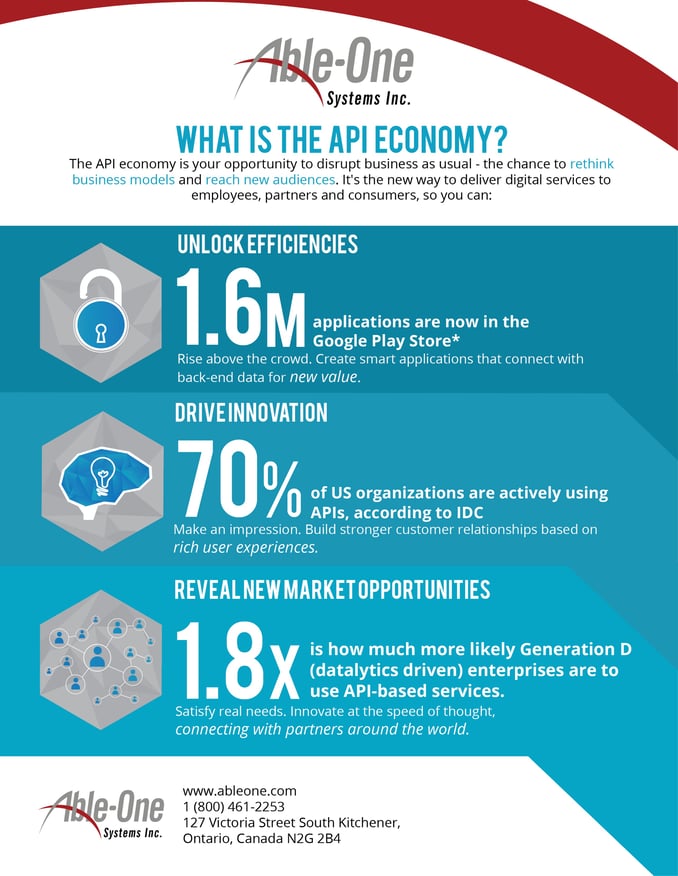
To learn more, join us at our webinar on the API Economy, September 22nd, from 2 PM - 3 PM (EST)
Topics: Infrastructure
A flexible and affordable business continuity plan, particularly one that addresses system redundancy and accessibility, while ensuring that the worst case scenario is looked after… is a an investment that a business takes to ensure a peace of mind and credibility. Beyond being looked at as worst-case scenario plan, or “the likelihood of this happening is slim to none”, a business can affirm its dedication to excellent service, above all to its customers, through a well-constructed disaster recovery solution.
Working with Rocket Software, Able-One implemented the iCluster replication software on Contrans’ production and high availability servers. Contrans is one of the largest freight transportation companies in Canada, with approximately 1,500 power units and 2,600 trailers under its management. The implemented software replicates transactions in real time so that data is consistent on both servers. In the event of a disaster, the backup server can be used for production with minimal loss of data. It can also be used to provide ongoing operations during periods of planned outage. Shortly after the disaster recovery solution was put in place for their production AS/400, Contrans Group Inc. experienced a complete loss of their main computer room through a water leak.
![]()
After implementing their Disaster Recovery/High Availability (DR/HA) solution Contrans was able to switch users to their backup system and get everything up and running within a couple of hours, with only minimal data loss. Darren Levine, Contrans’ IT Director said: “This was about as massive an impact to an IT infrastructure as you can have. But our customers didn’t even realize we’d had an outage”.
During this project Able-One managed two cutovers: they installed the new production server in Contrans’ newly built computer room, and restored the backup server, including rolling over all applications and migrating data. With the Rocket iCluster software on production and DR/HA servers, Contrans can now rely on the availability of their data and applications. From their experience, they know their data is in sync and users can be moved to their backup system with minimal business disruption.
Darren adds, “This was our first project with Able-One: they lived up to our expectations and I would absolutely recommend them. They’re very responsive and agile, and they understand what we were trying to accomplish.”
Find out how exactly Able-One Systems helped Contrans avoid disaster. Download the full story here
Topics: Infrastructure, Disaster Recovery
As they grow, many organizations struggle with the challenges presented by separate locations and siloed business operations. Kraus Flooring was facing this issue with separate servers in Waterloo and Winnipeg, each of which dealt with a different aspect of the business – which would switch back to the head office in the event of a failure. This was aggravated by the fact that they were experiencing power reliability issues at the same head office, which was impacting their ability to provide consistent computing resources for the business, or handle disaster recovery effectively. They knew they needed to:

Able-One implemented an IBM power server configured with two logical partitions, modelled and sized to support the needs of their Winnipeg and Waterloo workloads. In addition, they consolidated Kraus’s x86 environment using VMware and shared storage. The new power server was deployed in Able-One’s co-location facility in their London data center, which has the fire suppression, cooling, power and security measures that can be costly to implement in a customer’s computer room – and especially to duplicate in multiple locations. Able-One managed the entire project end-to-end, including migrating each of the server workloads to its partition on the power server in the data center.
With their new server consolidation in Able-One’s co-location facility, Kraus Flooring has achieved the economy of scale and reliability they sought.
Find out how exactly Able-One Systems helped Kraus Flooring achieve their goals. Download the full story here.
Topics: Infrastructure
With the continued growth in Linux and open source solutions, it is no surprise that IBM has increased their focus on Linux on IBM Power Systems. IBM has been an active Linux participant for over 15 years and continues to be one of the leading commercial contributors to the Linux community today. In September 2013 IBM made an additional $1 billion dollar Linux investment which included the opening of a new Power Systems Linux Center & many innovations around the world. One of the game changing innovations that came from that investment was IBM Watson, IBM’s self-learning computer that beat Jeopardy (check out the video below), but can you guess what platform it is built on? That’s right, Linux on Power.
In the spirit of Open Source, IBM has developed specific tools for Power (free of charge of course) to ensure their users are provided additional value. Some of the most popular are the IBM installation toolkit for Power Linux, Software Development Kit, and Advance Toolchain.
IBM made a very strategic move with the announcement that Little Endian is supported with the introduction of the Power 8 processors. The x86 Linux application ecosystem is very large and x86 platforms use Little Endian mode. That announcement definitely contributed to a significant increase in interest in PowerLinux by both customers and Linux application providers. The list of Linux applications now supported on PowerLinux is growing rapidly. A good blog to read on this topic is “Just the FAQs about Little Endian” by Jeff Scheel, IBM Linux on Power Chief Engineer. https://www.ibm.com/developerworks/community/blogs/fe313521-2e95-46f2-817d-44a4f27eba32/entry/just_the_faqs_about_little_endian?lang=en
In comparison to x86, many people now accept that running Linux applications on IBM Power will lead to better performance and reliability. What surprises many is the lower total cost of ownership (TCO) typically found for PowerLinux solutions versus x86. The lower TCO is a result of IBM’s aggressive Linux on Power pricing combined with lower total costs for databases and Linux applications that are often priced per core. Typically many more cores are required in an x86 environment to adequately run the same workload versus what is required with PowerLinux.
IBM’s Power Systems support the industry standard SUSE, Redhat and Ubuntu Linux distributions as highlighted below:
IBM and SUSE http://www.ableone.com/linux-on-power-suse/)
"IBM believes open standards and open-source software are absolutely critical to the future of IT, and IBM actively supports and encourages the adoption of Linux. Our partnership with SUSE is a key component of this Linux strategy."
- Jean Staten Healy Director, Linux Strategy, IBM
IBM and Redhat - http://www.ableone.com/linux-on-power-redhat/
“As prominent members of the open source community, Red Hat and IBM have a long history of making significant investments in Linux technology. Red Hat is a leading provider of open source solutions and IBM is one of the largest Linux contributors”
IBM and UBUNTU - (http://www.ableone.com/linux-on-power-ubuntu/
“The leading platform for scale-out computing, Ubuntu Server helps you make the most of your infrastructure. Whether you want to deploy an OpenStack cloud, a Hadoop cluster or a 50,000-node render farm, Ubuntu Server delivers the best value scale-out performance available.”
If you would like to discuss more of what Linux on Power can do for you and your organization or have any other questions please do not hesitate to contact us today! (http://www.ableone.com/about/contact/ )
Topics: Infrastructure, PHP, linux on Power
127 Victoria Street South
Kitchener, ON N2G 2B4 Canada
Email: info@ableone.com
Toll Free: (800) 461-2253
© 2017 Able-One. All Rights Reserved.